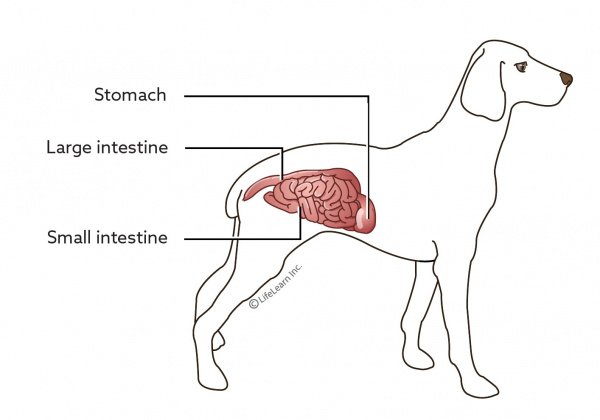
Gastroenteritis in Dogs
Symptoms Similar to Parvovirus By Tammy Hunter, DVM; Ernest Ward, DVM

What is gastroenteritis?
Gastroenteritis refers to inflammation of the gastrointestinal tract, meaning the stomach and the intestines. It can be caused by infection with bacteria, viruses, parasites, medications, or even new foods. The condition often causes abdominal pain, diarrhea, vomiting, and/or other clinical signs.
What are the signs of gastroenteritis?
Most dogs with gastroenteritis will have intermittent episodes of vomiting and diarrhea. The vomit may contain foamy, yellowish bile, especially after the stomach has been emptied. Many owners will observe dry heaving or gagging after their dog eats or drinks.
Most dogs with gastroenteritis will have intermittent episodes of vomiting and diarrhea.
Characteristically, there will be large volumes of diarrhea produced several times a day. The diarrhea may have the consistency a soft-serve ice cream. Many dogs will be tender when picked up around the abdomen or will resist handling of the stomach and hindquarters. Most dogs affected with gastroenteritis will appear less active (lethargic) and have a decreased appetite. A low-grade fever is also common. Dehydration can occur quickly if the vomiting and diarrhea persists for more than twenty-four hours.
How is gastroenteritis diagnosed?
Gastroenteritis is a diagnosis of exclusion. This means that your veterinarian will eliminate or rule out other more serious causes of the clinical signs before making a general diagnosis such as gastroenteritis. The first step toward determining what is causing a dog's vomiting, diarrhea, lethargy, and other associated clinical signs are a good medical history.
Some key information in your dog's medical history includes:
-
Your dog's current diet, how much you feed and how often you feed your dog.
-
Everything your dog ate or drank within the past 48 hours.
-
Any new foods, treats, or rewards.
-
Any recent exposure to pesticides, medications, cleaning agents, or any other new materials in your home environment.
-
Any recent exposure to a new animal or person.
-
Any previous episodes of vomiting and diarrhea (including their cause and treatment).
-
Any illness within the past month.
-
Any chronic illnesses your dog may have.
-
Any medications, vitamins, or supplements given within the past month
Your veterinary health team may have you fill in a questionnaire prior to your visit. See handout “Diarrhea Questionnaire and Checklist for Dogs” for an example.
After obtaining the medical history, your veterinarian will perform a thorough physical examination. Your veterinarian will look for evidence of dehydration, abdominal pain or tenderness, bloating or gas, swellings, or any other physical abnormality. Your dog's temperature and other vital signs (heart rate and respiratory rate) will be recorded.
At this stage, diagnostic testing will be recommended, and may include:
-
Complete blood cell count (CBC) - indicates the presence of dehydration and infection.
-
Serum chemistries and electrolytes - detects organ system abnormalities and electrolyte imbalances due to vomiting and diarrhea.
-
Urinalysis - detects urinary tract infections, kidney disease, dehydration, urine glucose for diabetes, etc.
-
Abdominal radiographs (X-rays) - to search for gastric (stomach) or intestinal obstruction or other abnormal findings.
-
Abdominal ultrasound - to look for intestinal obstructions or other abnormalities.
Your dog's specific diagnostic work-up will be determined by the severity and duration of clinical signs, medical history, and physical examination. Once the diagnostic tests are complete and other causes of the clinical signs have been eliminated, treatment will be prescribed.
What are some of the causes of gastroenteritis?
There are many causes of the symptoms of vomiting and diarrhea in dogs. Some of the more common conditions that your veterinarian will attempt to eliminate during the diagnostic workup include:
-
infections (e.g., bacterial, viral, fungal, or parasitic)
-
foreign bodies (especially string or thread) or other objects
-
intussusception (the telescoping of the intestine into itself, causing an intestinal blockage)
-
tumors/cancer
-
poisoning/toxins (e.g., plants, cleaning agents)
-
endocrine disease (e.g., diabetes, hyperthyroidism)
-
pancreatic, liver, or kidney disease
This is only a partial list of some of the more serious conditions that can cause vomiting and diarrhea in dogs. Your veterinarian may discuss other possibilities based on your dog's specific condition.

How is gastroenteritis treated?
The principal treatment of gastroenteritis is rehydration and restoration of blood electrolyte balance (sodium, potassium, and/or chloride). Depending on the degree of dehydration, this fluid replacement will be given orally, subcutaneously (beneath the skin), or by intravenous (IV) treatment.
The principal treatment of gastroenteritis is rehydration and restoration of blood electrolyte balance.
Medical treatment may also include:
-
Antibiotics (e.g., metronidazole, ampicillin) may be administered if the clinical signs are severe or if diagnostic tests suggest a bacterial infection.
-
Antidiarrheal drugs may be used to alter intestinal motility (activity) after intestinal obstruction or other mechanical and anatomical issues have been ruled-out. If your dog is experiencing severe colitis, motility-modifying agents are generally not recommended.
-
Anti-emetic (anti-vomiting) medications, for example maropitant (brand name Cerenia®) or metoclopramide (brand name Reglan®) may be given to your dog.
-
Gastrointestinal protectants used to prevent stomach ulcers, for example famotidine (brand name Pepcid®) or ranitidine (brand name Zantac®).
Food is often withheld during the initial stages of treatment for 24-48 hours and then slowly reintroduced. Small, frequent feedings of a highly digestible, low fat diet are generally prescribed. Your veterinarian will advise you on the best diet to feed your dog for a speedy recovery.
What is the prognosis for gastroenteritis?
Most cases of acute gastroenteritis improve rapidly after rehydration. If the vomiting and diarrhea do not improve significantly within 48 hours of treatment, call your veterinarian.
Early recognition and treatment are the cornerstones to returning your dog to his normal healthy state as quickly as possible.
Gastroenteritis is a common condition seen in veterinary practice. Early recognition and treatment are the cornerstones to returning your dog to his normal healthy state as quickly as possible. If you have any further questions or concerns, please contact your veterinarian.
Contributors: Tammy Hunter, DVM; Ernest Ward, DVM